- Home
- Andy McNab
Red Notice Page 4
Red Notice Read online
Page 4
Tom’s team peeled out of the room. They found the Scotsman fitting a framed charge down the hinged side of a steel-reinforced door. They flattened themselves against the wall. Jockey detonated the charge, then led the way into the basement. It was pitch black down there, but he left the light switch untouched in case it was booby-trapped. Hyper-alert, he moved down the steps, his gaze tracking the beam of the Maglite fixed to the barrel of his MP5. His team followed, ready to fire their ARWENs the instant the torch beam illuminated a target.
They found themselves in a large, completely empty cellar. There were none of the usual rich man’s embellishments, no swimming pool, no home cinema, no cavernous wine store, just bare, freshly skimmed concrete.
Tom headed for the doorway opposite.
He stood to the left of the frame, ARWEN in the shoulder, forefinger on the trigger, muzzle pointed to where the door would swing open towards the assault teams. Jockey joined him, Maglite at the ready. Blue Five gripped the handle, turned it and pulled.
11
DELPHINE SIFTED THROUGH the evening’s bookings, then glanced at her watch for the twentieth time in as many minutes. The seventeen months she’d been working at the Green Dragon had gone in a flash, but this afternoon was crawling by.
A warren of low beams, bumpy walls and creaking floorboards, the old coaching inn felt as if it had been around as long as Hereford had. It was ye kind of olde place where the Rotary Club met every Friday, and Saga coach tours stopped for scones and tea after a trip to the nearby cathedral. It also had a grand Georgian frontage on Broad Street that often led visitors to expect a level of style and service that the hotel simply could not offer.
Delphine had a degree in hotel management from the University of Paris-Sud 11, and was working her way up through the ranks of the chain that owned the Green Dragon. She didn’t find Hereford the most exciting of places. At first it had seemed like any other six-month posting, one to be endured before she moved on with barely a backward glance.
The youngest of three girls, she’d been brought up in a small guesthouse their parents ran just outside Nice, on the Monaco side of the city, overlooking the sea. Both her sisters were now married, with children, and lived in Paris. But Delphine wasn’t ready for that just yet. She wanted to see the world.
She worked in the office by day and on Reception at night, soaking up the hands-on experience. All being well, within a year she would be ready to manage one of the three compliance teams that travelled the world checking the chain’s hotels, making sure the guests’ ‘high-comfort experience’ was everything it should be.
The two previous years on the management course had gone according to plan. She had excelled in Dubai, Berlin and Vancouver. But then, in her first week in rain-lashed Hereford, she’d met Tom Buckingham.
Until then she had never heard of the SAS, but had known immediately that they were trouble. The group gathered around the bar were men who carried themselves . . . if not with a swagger, then with complete self-confidence, as if life held no surprises for them and presented no problems they couldn’t solve. Their clothes were casual – blue jeans, T-shirts and tight leather jackets – but seemed almost like a uniform. As soon as they appeared, the local girls hovered around them, like bees.
Delphine had seen one reach into his jacket, heard the rasp of Velcro. She gave her flatmate a quizzical glance. ‘Are buttons and zips too complicated for your British men?’
Moira, a bottle-blonde a couple of years ahead of her, had put a finger to her lips. ‘It’s not just their pockets. It’s everything. Work and play. They like everything well fastened. You can ask them stuff, but you’ll never get an answer.’
One of the group was in a wheelchair, another on crutches, with a shiny new steel leg that glinted beneath his trouser leg when he sat down. They were treated as part of the gang and subjected to the same relentless banter, but complex emotions could be read in their more unguarded looks. Delphine had wondered if the pleasure they took in being reunited with their friends was not outweighed by painful reminders of a life that had once been theirs and would never return.
‘I think maybe these boys are a little bit sad . . .’
Moira took her to one side. ‘Trust me, Delphine, they’ll all be chasing you. Even the ones with no legs. You’re a beautiful girl.’
Delphine felt her cheeks go pink and shook her head. She was tall and slim, with jet black hair cut into a bob and a fringe that brushed her dark brown eyes, but she never thought of herself as special.
Moira was in full advice mode. ‘If you want my two-penny-worth, pick one of the townies, not these guys. The Men in Black are full of charm and chat, but everything’s a competition – and that includes who’ll be the first to screw the new girl.
‘And don’t ever make the mistake of falling in love. The Regiment isn’t just a job, it’s the whole of their lives. That doesn’t leave much room for wives or girlfriends. No matter how hard you try, you’re always going to be second best.’ Her lips had tightened and there was a note in her voice that was both bitter and wistful. Her gaze shifted to the window and she stared, unseeing, out into the darkness.
‘What is this “Regiment”?’ Delphine said.
Moira had stared at her, astonished, then burst out laughing. ‘My, you have got a lot to learn about Hereford, haven’t you? It’s the SAS. You know – the Iranian Embassy siege, the boys who cleared the caves in Afghanistan?’
Nothing was registering with Delphine.
‘The fit-looking guys? They’re soldiers – Special Forces.’ Moira winked. ‘But, trust me, they’re not half as special as they think they are.’
As Moira had predicted, a succession of them tried their luck with Delphine that first evening, and over the following nights virtually all of them put the word on her at one time or another, but she brushed them off. They were young, fit and strong, and some were good-looking, but she had watched the succession of local girls coming and going, leaving with one or other of the men one night and ignored the next, and was determined that that was not going to happen to her.
The one they called Posh Lad hadn’t spoken to her, but she was aware of his eyes on her, and as she talked with Moira and her friends she found herself glancing surreptitiously at him in return. He seemed more thoughtful than his mates; she sensed there were depths to him that most of the others didn’t share. She was captivated by the way that, when he was deep in thought, his fingers often strayed absently to the crinkled white scar etched across his temple, beneath his short, side-parted dark brown hair. He traced its contours like a blind man reading braille.
Gavin was the first to notice. He’d tried – and failed – to chat up Delphine once before, but then decided on a change of tack. When it became clear that the West Country magic still wasn’t working, he took half a step back and said, ‘But I’m wearing one of his shirts . . .’
She just looked puzzled.
‘And his jeans.’ He stuck out a denim-clad leg for her to admire. ‘A new pair.’
Delphine frowned.
‘I know I’m not up there with Posh Lad, but I thought you might fancy me a bit if I was wearing his clothes.’
Now she was embarrassed. ‘Why do you call him that?’
Gavin smiled. He knew he was about to do Tom’s groundwork, but so what? He was a mate. And if he scored, Gavin would take all the credit. ‘One: rich family. Two: he always uses the right tense. Three: he owns a fountain pen. Four: he’s got name-tapes in his socks. That’s pretty posh to trogs like us.’
‘Why do you make so much fun of him? He sounds a good man.’
‘He is. A very good man. There’s nothing grim – nobody thinks any the less of him because he’s posh – it’s just banter. Anyway, happy days. See you around.’
When Tom had asked her out about two weeks after they’d first set eyes on each other, she had turned him down. But she’d hesitated as she did so, and found herself blushing again.
He’d held her gaze for
a moment. ‘I’ll only ask once more, and that’s it.’
‘That’ll be a relief for us both.’
His look had darkened for an instant, and then he burst out laughing. ‘You don’t like us soldiers much, do you?’
‘How can I tell? You’re the first ones I’ve ever met and I don’t know you all.’
‘Then spend your time getting to know just me. It’ll be easier than trying to learn so many new names.’
She smiled. ‘Was that the “only once more” you were talking about?’
A grin had spread across his face. ‘I’m not sure. It might be. Would your answer be the same?’ He paused, trying to read her expression. When he spoke again, to her surprise it was in flawless, almost accentless French. ‘Don’t believe everything some people tell you,’ he said, glancing towards Moira. ‘We’re not all heartless bastards.’ There was another pause. ‘So . . . now or never, what will it be?’
She had studied him in silence for a moment. ‘Now,’ she said, and surprised herself by doing so. ‘And then perhaps never again.’ She wrote her mobile number on a scrap of paper and handed it to him. ‘Better go back to your friends now,’ she said. ‘And tell them you’ve won the bet.’
He laughed. ‘Don’t knock it! The winnings will pay for dinner tomorrow night.’
‘I’m working,’ she said, switching back to English.
‘I’m sure Moira wouldn’t mind covering for you, would you, Moira? Call her in sick?’
Moira had looked up from the paper she’d been pretending to read. ‘Me do you a favour, Tom Buckingham? Why on earth would I want to do that?’
‘Because you’ll be doing Delphine a favour, too.’
She’d smiled, despite herself. ‘I’m not so sure about that.’
‘Sorted, then.’ He turned back to Delphine. ‘I’ll pick you up at eight. Where are you living?’
‘She’s renting the spare room at mine,’ Moira said. ‘You still remember the way there, don’t you?’
Delphine’s eyes narrowed, but Moira’s expression gave nothing away.
As Tom had walked back to the bar, there was a burst of banter and barracking from his mates. ‘Mate, better luck next time. Maybe she just wants a bit of rough.’
‘Yeah, nice try, Posh Lad,’ Jockey said. ‘But not even your best parlay-voo could break down the ice maiden, eh?’
‘I think she wants a real action man like me,’ Keenan said. ‘Not some limp-wristed, boater-wearing nancy-boy.’
‘Yeah, you’re probably right,’ Tom had said, savouring the moment. ‘I was a fool even to try. On the other hand . . .’ He’d flashed the scrap of paper. ‘I do seem to be the only one around here who’s got her phone number. Your round is it, Jockey?’
12
THE TORCH BEAM penetrated the strip of darkness widening behind it. Tom kept his ARWEN barrel over Jockey’s right shoulder as they moved through the gap into an equally bare room. Its walls were broken only by a massive steel door beneath a small, wired-glass window.
They repeated the pattern and this time Bryce grabbed the handle. It didn’t open. His team prepared their last charge as the net hummed with instructions for the loading of prisoners, their handover to the police and the corralling of the media.
As Maglites lit the darkness around the door so that the charge could be positioned, Tom glimpsed a flash of bare metal just beneath the window frame. ‘Fuck! Bryce – bin it! Look at this.’ He pointed to a minute length of copper wire that led from the wall to the bottom edge of the steel window frame. ‘The window’s wired to something. Which probably means the door is too. No prizes for guessing what.’
Bryce studied the window for a moment, then scraped away a little of the putty surrounding the wire. ‘It feeds through to the other side,’ he said. ‘Break any of the wires set in that glass and I’m guessing it’d be time to put your head between your legs—’
‘And kiss your arse goodbye.’ Tom leaned his back against the door, knees bent, creating a platform with his thighs. ‘Jockey, get up there and have a look.’
Jockey climbed onto Tom’s legs, put one Hi-Tec assault boot on his shoulder, then the other, and peered through the window. Five seconds later he was back down and on the net. ‘Alpha, this is Blue One – we have an IED in the basement, blocking our advance. At least twenty kilos of PE. There’s a tunnel beyond it. Has to be X-ray One’s escape route.’
Bryce started to move his team back the way they had come. He knew what was about to happen.
Tom did too, and followed. The ATO (Ammunition Technical Officer) would take care of the IED, and the police would take back operational command of the incident. Military Aid to the Civil Power (MACP) was always a bit of a slap in the face for the Met. It meant armed assistance when the police were unable to cope – with riot, organized crime or terrorism. It was always a big deal for them to hand over control of a criminal situation to the military on UK soil, so they didn’t waste a minute snatching it back.
Gavin’s voice crackled in the Blue team’s ears. ‘Alpha, roger that. Blue One, stay with the IED until the ATO arrives. All other call-signs withdraw. Move back to the holding area. Out.’
13
‘LASZLO’S GONE.’ GAVIN tried to rub the tiredness from his eyes. ‘And he’s left a bloody great IED as a farewell present. Days like this make me wish I was a Frog . . .’
Ashton nodded. ‘Or a Russian.’
The Compagnies Républicaines de Sécurité (CRS) were specially trained to deal with riots and other circumstances that fell awkwardly between the maintenance of law and order and outright war. The Interior Ministry of the Russian Federation had its own armed troops to deal with major riots, terrorism and low-level insurrection.
‘Fuck it.’ Gavin brought his fist down on the table. ‘We’d have had him if that lot –’ he jerked his head in the vague direction of central London ‘– had got their shit together.’
‘Some you win.’ Ashton got to his feet and stretched his arms above his head. ‘OK, wrap it up. We need to be out of here before the media circus hits town.’
Woolf continued to bark instructions into his phone. ‘That’s what I said, and that’s what I want: a nationwide lockdown. Every airport, seaport and railway station. Get it done now.’
He broke the connection and met the 3i/c’s stare.
‘We waited too fucking long,’ Gavin said.
‘Bollocks. You messed up, pure and simple. And now we’re going to have to go and find him all over again.’
Gavin gave a snort. ‘Unless he grows wings, how hard can it be? It’s a fucking island, isn’t it?’
‘It took three years to track him down the first time. He may be a mass-murdering psychopath to us, but he’s the number-one poster boy in South Ossetia. You just saw how men – and even women, for heaven’s sake – are prepared to die for him. Laszlo is like a god to them. If he goes underground again, the Russian network will make damn sure we don’t get anywhere near him.’
‘You’d better crack on before he does, then.’
‘Crack on? Of course we’re going to bloody crack on.’ Woolf was close to blowing a fuse. ‘Because while you Special Forces “blades” are diving for cover, we’ll have every toe-rag reporter in our faces, every paper in the world printing pictures of Laszlo’s victims and demanding to know why we – we, not you – failed them.’ He grabbed his papers and stormed out of the room, but rather spoiled the effect when he realized he had left his mobile behind and had to retrace his steps, avoiding Gavin’s eye, to collect it.
Gavin packed up his kit as sirens wailed and the beat of TV-network helicopters filled the air. He grinned at the landlord. ‘Mate, you can have your pub back now. It’s been a real pleasure. Next time, why don’t you come over to ours?’
‘And my pictures and ornaments? Who’s going to put those back?’
‘I’ll give you a clue,’ Gavin said. ‘Three letters, starts with y and rhymes with “screw”. Have a nice day now.’
14
THE WOMAN WALKED downhill, away from the Heath, towards the dry-cleaner’s. Her daughter stuck close by her side. The police cars and helicopters were frightening her. And so was the man in the wheelchair.
He seemed hunched with age and pain and, shadowed by his hat, his face was as pale as a ghost’s. A scarf was wrapped around his neck and a blanket covered him right up to his chin.
‘Where are we going now?’ the child said. ‘Can we go home?’
The woman shook her head. ‘Later, darling. First we have to go back to the shop.’
‘But I want to go home, Mamochka.’
‘Not now, little one. Later, I promise.’
The man in the wheelchair smiled at the child and held out a hand from under the blanket for her to grip. ‘What is your name, little one?’
She didn’t take the hand, moving still closer to her mother. ‘Lilya.’
‘Do you like living here, Lilya?’
‘It’s not like my real home.’ Her tone was sullen. She missed her little friends and her uncles, who spoiled her with sweets.
‘A lot of things here are not like home,’ her mother said. ‘Some are better, some are worse, but at least we are safe.’
They turned a corner, away from the police vans throwing out streams of officers to create an outer cordon around the incident on the Heath.
‘And what can go wrong on such a beautiful day?’ the man said. ‘It’s so warm you would scarcely believe it was autumn. Tell you what, Lilya, I have just one little job to do in that steamy, smelly dry-cleaner’s, and then we can all go and get some ice-cream. Would you like that?’
She brightened at once and even took his hand as a couple of speeding police cars screamed past. A moment later, a van turned in towards them and pulled up with a screech of brakes. Two policemen jumped out and threw on their hi-vis jackets. The van drove past and stopped once more. More men streamed out and began erecting a barrier across the street.

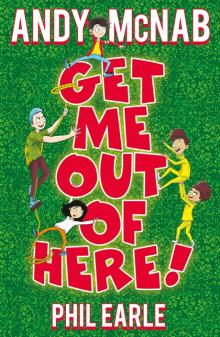 Get Me Out of Here!
Get Me Out of Here!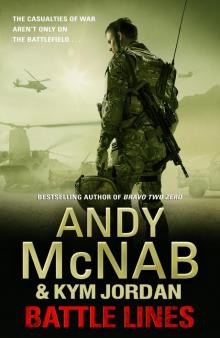 Battle Lines
Battle Lines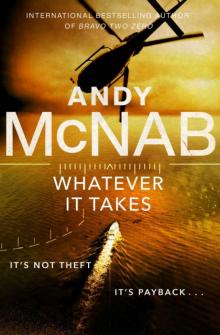 Whatever It Takes
Whatever It Takes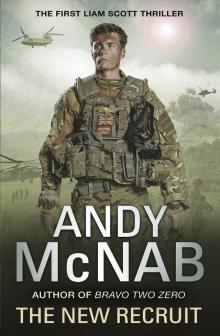 The New Recruit
The New Recruit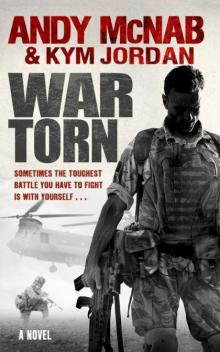 War Torn
War Torn Brute Force
Brute Force Crossfire
Crossfire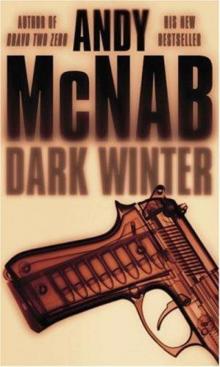 Dark Winter ns-6
Dark Winter ns-6 The Grey Man
The Grey Man Spoken from the Front
Spoken from the Front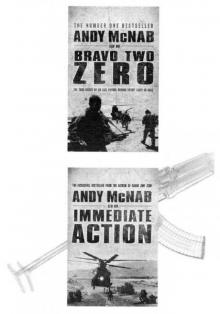 Meltdown
Meltdown Recoil
Recoil Nick Stone 1 - Remote Control.
Nick Stone 1 - Remote Control.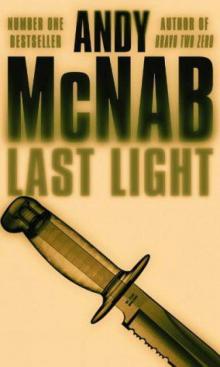 Last Light ns-4
Last Light ns-4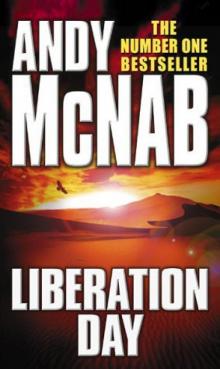 Liberation day
Liberation day Deep Black
Deep Black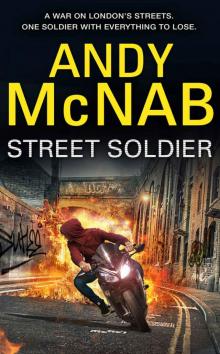 Street Soldier
Street Soldier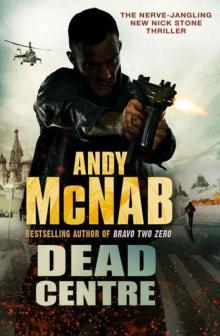 Dead Centre ns-14
Dead Centre ns-14 Exit wound ns-12
Exit wound ns-12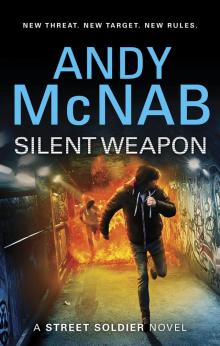 Silent Weapon
Silent Weapon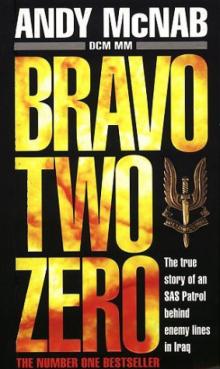 Bravo two zero
Bravo two zero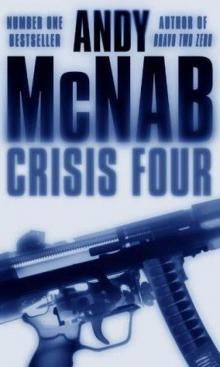 Crisis Four ns-2
Crisis Four ns-2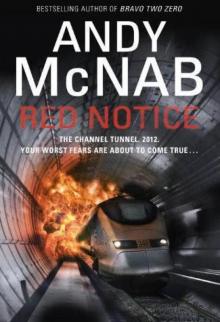 Red Notice
Red Notice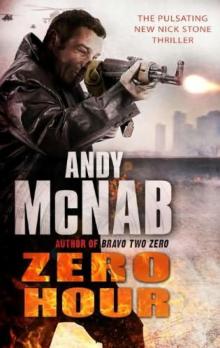 NS13 Zero Hour
NS13 Zero Hour Firewall
Firewall Last Light
Last Light Aggressor
Aggressor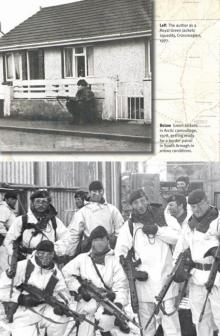 Seven Troop
Seven Troop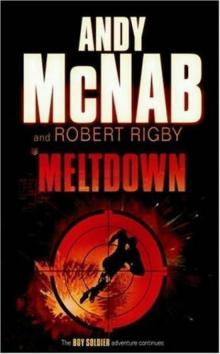 Meltdown bs-4
Meltdown bs-4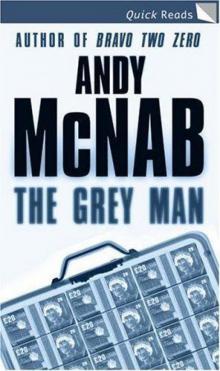 The Grey Man (quick reads)
The Grey Man (quick reads)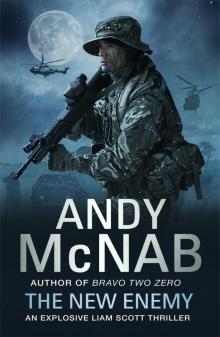 The New Enemy
The New Enemy Avenger
Avenger FireWall ns-3
FireWall ns-3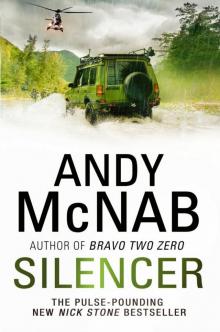 Silencer
Silencer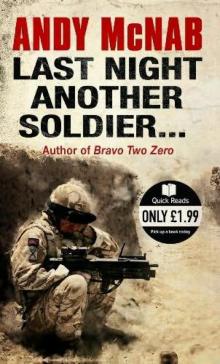 Last Night-Another Soldier…
Last Night-Another Soldier…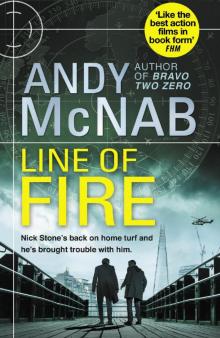 Line of Fire:
Line of Fire: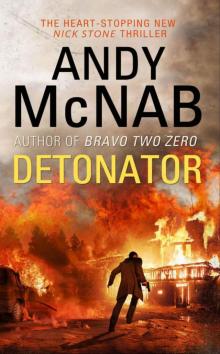 Detonator
Detonator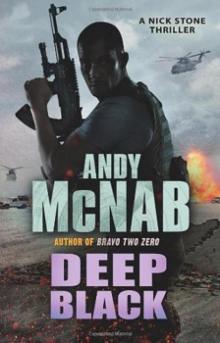 Deep Black ns-7
Deep Black ns-7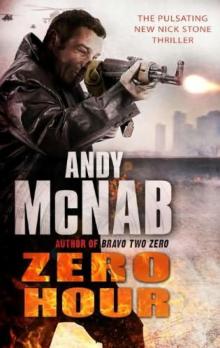 Zero Hour (2010) ns-13
Zero Hour (2010) ns-13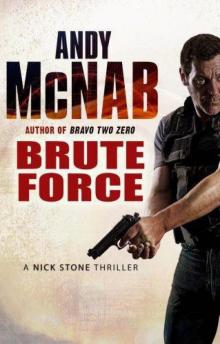 Brute Force ns-11
Brute Force ns-11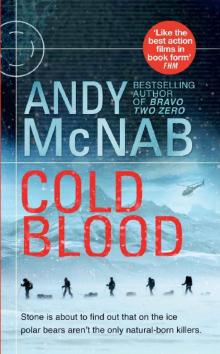 Cold Blood
Cold Blood Terminal Velocity
Terminal Velocity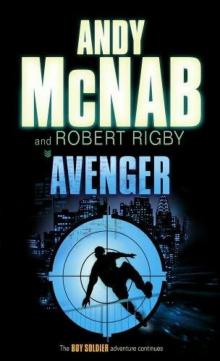 Avenger bs-3
Avenger bs-3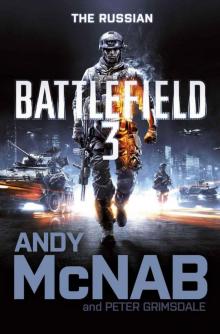 Battlefield 3: The Russian
Battlefield 3: The Russian DropZone
DropZone Zero Hour
Zero Hour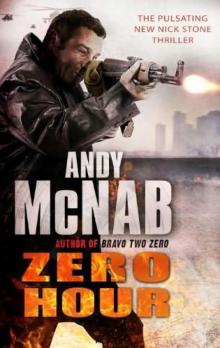 NS13 Zero Hour (2010)
NS13 Zero Hour (2010)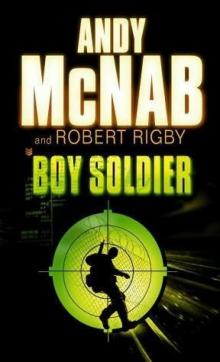 Boy soldier bs-1
Boy soldier bs-1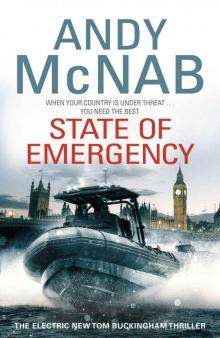 State Of Emergency: (Tom Buckingham Thriller 3)
State Of Emergency: (Tom Buckingham Thriller 3)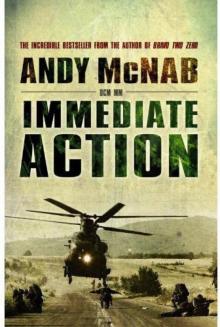 Immediate Action
Immediate Action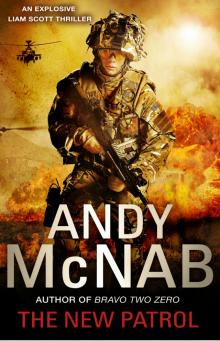 The New Patrol
The New Patrol Crisis Four
Crisis Four Boy Soldier
Boy Soldier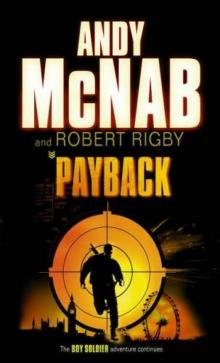 Payback bs-2
Payback bs-2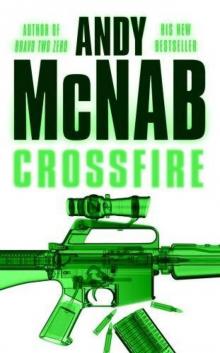 Crossfire ns-10
Crossfire ns-10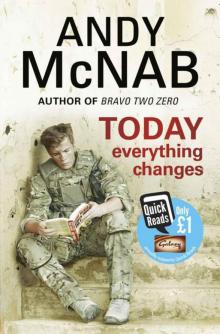 Today Everything Changes: Quick Read
Today Everything Changes: Quick Read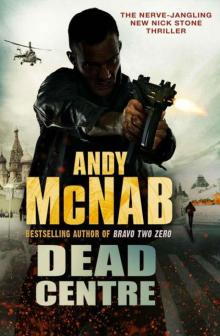 Dead Centre
Dead Centre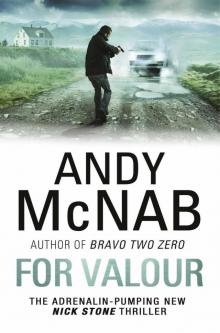 For Valour
For Valour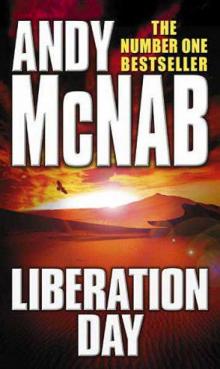 Liberation Day ns-5
Liberation Day ns-5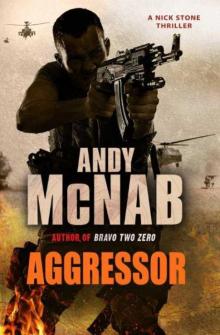 Aggressor ns-8
Aggressor ns-8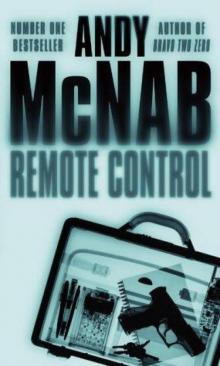 Remote Control ns-1
Remote Control ns-1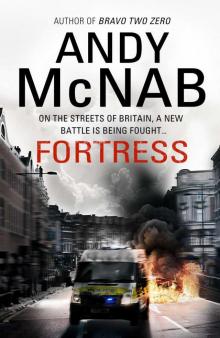 Fortress
Fortress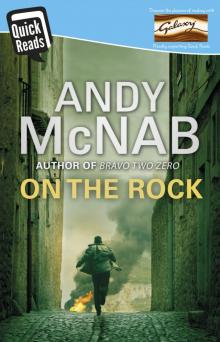 On the Rock
On the Rock Dark Winter
Dark Winter